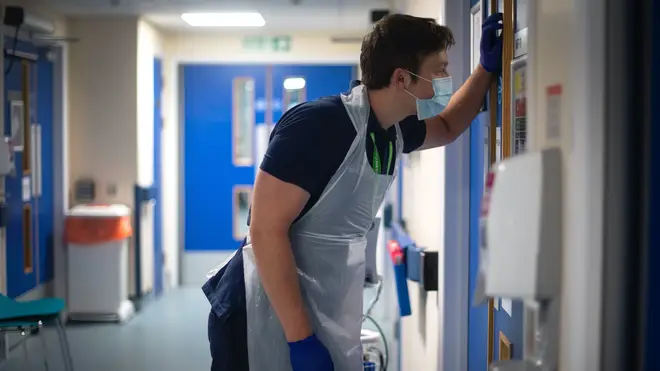
Richard Spurr 1am - 4am
8 June 2021, 07:53 | Updated: 8 June 2021, 12:55

The future of NHS and social care services is at risk as staff burnout reaches "emergency" levels, MPs have warned.
A highly critical report has called for immediate action to support exhausted staff who have worked throughout the Covid-19 pandemic.
But it also pointed to long-standing, unresolved issues that existed before the pandemic.
READ MORE: NHS staff suffering 'unacceptable exhaustion' after Covid pandemic, study finds
WATCH: Nick Ferrari asks if NHS staff deserve 'disgraceful' 1% pay rise 'after saving PM's life'
The Royal College of Nursing (RCN) told MPs there were 50,000 nursing vacancies in the UK pre-Covid, while the Royal College of Psychiatrists said a lack of staff is one of the biggest causes of workforce burnout in mental health services.
Former health secretary Jeremy Hunt said the situation "presents an extraordinarily dangerous risk" to the future of the services.
In their new report, the Health and Social Care Committee called for a "total overhaul of the way the NHS does workforce planning".
It said the pandemic has "revealed so many critical staff shortages" which have been "the biggest driver of burnout".
"The least we can do for staff is to show there is a long-term solution to those shortages", it added.

NHS staff reflect on a year of coronavirus pandemic
The study said: "The way that the NHS does workforce planning is at best opaque and at worst responsible for the unacceptable pressure on the current workforce which existed even before the pandemic.
"It is clear that workforce planning has been led by the funding envelope available to health and social care rather than by demand and the capacity required to service that demand."
The MPs said without a proper public statement on the staffing needs for the next decade, "the shortages in the health and care workforce will endure, to the detriment of both the service provision and the staff".
They said they "recommend again" that Health Education England publishes "objective, transparent and independently-audited" annual reports on workforce needs for health and social care that cover the next five to 20 years.
Tory MP Mr Hunt, who is chairman of the committee, said: "Workforce burnout across the NHS and care systems now presents an extraordinarily dangerous risk to the future functioning of both services.
"Staff face unacceptable pressure with chronic excessive workload identified as a key driver of workforce burnout.
"It will simply not be possible to address the backlog caused by the pandemic unless these issues are addressed.
"Achieving a long-term solution demands a complete overhaul of workforce planning.
"Those plans should be guided by the need to ensure that the long-term supply of doctors, nurses and other clinicians is not constrained by short-term deficiencies in the number trained."

'There are NHS doctors and nurses experiencing PTSD symptoms due to Covid'
The NHS Staff Survey found 44% of staff reported feeling unwell as a result of work-related stress in the previous 12 months.
But before the pandemic, the NHS faced shortages of around "one in 10 or one in 12 staff", the report added.
Meanwhile, Skills For Care estimated that 7.3% of roles in adult social care had been vacant during the financial year 2019-20, equivalent to around 112,000 vacancies at any one time.
Professor Martin Green, chief executive of social care membership body Care England, welcomed the findings of the report but stressed the sector needed more than just financial support.
He said: "Money alone is not the answer. We need to ensure that social care is established as a career with the kudos associated with due professionalisation and one way to deliver that would be a ten year plan for workforce akin to that of the NHS."
Professor Martin Marshall, chairman of the Royal College of GPs, said: "This report by the Health and Social Care select committee highlights the intense pressure that colleagues have faced across the health service, much of it as a direct result of inadequate staff numbers and appropriate workforce planning for the future.
"We simply don't have enough GPs or other members of the practice team to meet demand and general practice is only set to get busier as we support our communities' recovery from the pandemic."
Dr David Wrigley, the British Medical Association's well-being lead, said: "Health and care staff suffered stress and work-related anxiety before the pandemic but it is now far more serious and we believe the current level of staff burnout and stress presents a worrying risk to the future functioning of the health and care system and safe patient care."
The RCN's acting general secretary, Pat Cullen, added: "The unprecedented demand on nursing staff during the pandemic has had a huge impact on their own well-being.
"But, as this report shows, the cracks in the systems designed to look after nursing staff appeared years ago."